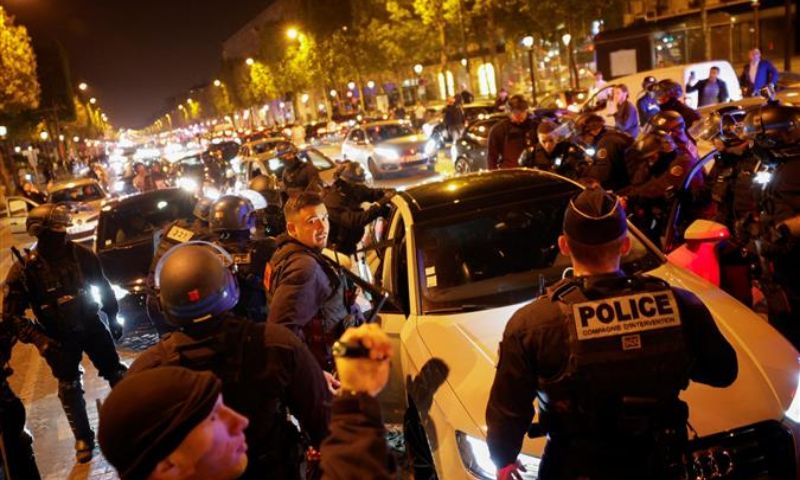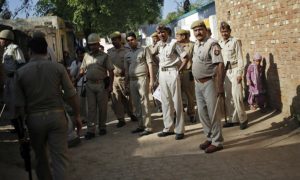PARIS: France experienced a fifth consecutive night of rioting as young protesters clashed with police and targeted a mayor’s home with a burning car. However, compared to previous nights, the overall level of violence appeared to have decreased.
Authorities reported 719 arrests nationwide by early Sunday following a massive security deployment aimed at quelling the widespread social upheaval. The escalating crisis poses a new challenge to President Emmanuel Macron’s leadership, shedding light on deep-seated discontent in low-income neighborhoods due to discrimination and a lack of opportunities.
The unrest was triggered by the police killing of a 17-year-old teenager, identified only as Nahel, whose funeral took place on Saturday in his hometown of Nanterre, a suburb of Paris. Emotions still ran high in the area over his tragic loss.
As night fell over the French capital, a small crowd gathered on the Champs-Elysees to protest Nahel’s death and police violence. However, they were met with a strong police presence guarding the iconic avenue and its luxury boutiques. In another neighborhood in northern Paris, protesters set barricades on fire and launched firecrackers while police responded with tear gas and stun grenades.
The mayor of the Paris suburb of l’Hay-les-Roses became the target of a personal attack as a burning car hit his residence overnight. In recent days, several schools, police stations, town halls, and stores have been subject to fires or vandalism, but such a direct assault on a mayor’s home is uncommon.
Although skirmishes occurred in the city of Marseille, they appeared to be less intense than the previous night, according to the Interior Ministry. The police arrested 55 people in the city, thanks to the reinforced security presence.
Countrywide Arrests in France
Nationwide arrests were slightly lower than the previous night, which Interior Minister Gerald Darmanin attributed to the resolute action of security forces. Since Nahel’s death on Tuesday, a total of 2,800 people have been detained. While some residents and shop owners in targeted neighborhoods have welcomed the increased police presence out of fear, others view police behavior as the root cause of France’s current crisis, further fueling frustrations.
The ongoing violence has also affected President Macron’s diplomatic engagements. He made a phone call to German President Frank-Walter Steinmeier on Saturday, requesting the postponement of what would have been the first state visit by a French president to Germany in 23 years. Macron was scheduled to travel to Germany on Sunday.
The violence has taken its toll on both police and firefighters, with hundreds injured during the protests. Authorities have not released the number of protester injuries. In French Guiana, an overseas territory, a 54-year-old individual died after being hit by a stray bullet.
In response to the unrest, France’s Justice Minister, Dupond-Moretti, issued a warning that young people who promote violence on social media platforms like Snapchat could face legal prosecution. Macron has blamed social media for exacerbating the violence.
The timing of the unrest is concerning as Paris and other French cities are preparing to host the summer Olympics in just over a year, attracting athletes and millions of visitors. Organizers closely monitor the situation as they continue with preparations for the international event.
At a cemetery in Nanterre, hundreds of people gathered to pay tribute to Nahel as mourners carried his white casket from a mosque to the burial site. Among the attendees were many young Arab and Black men who saw in Nahel a reflection of themselves. His mother, dressed in white, walked amidst applause toward the grave. In a television interview, Nahel’s mother expressed her anger towards the officer who shot her son but not towards the police in general.
The killing of Nahel and the subsequent reaction serve as a poignant reminder of the persistent poverty, discrimination, and limited opportunities in neighborhoods across France, where many residents trace their roots to former French colonies, much like Nahel’s Algerian heritage.
Samba Seck, a transportation worker in the Paris suburb of Clichy-sous-Bois, where riots erupted in 2005, expressed his understanding of the anger felt by the rioters, stating, “Young people are afraid to die at the hands of police.” He highlighted the underlying issues of poverty, lack of housing, and low wages that contribute to the frustrations of the youth.
























